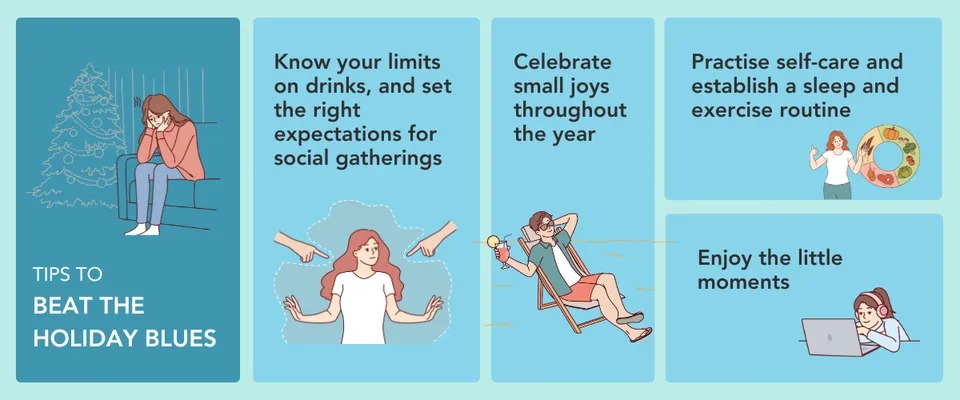Many factors cause the blues during the holidays. One reason is the pressure to meet society's idea of a "perfect" festive season.
The pressure of keeping up with the emotional demands of constant socialising and gift-giving can leave many feeling drained or overwhelmed. For those with financial constraints, trying to afford gifts for family and friends can create a sense of burden, stress and anxiety.
A season that focuses on togetherness can be hard for those without close connections. It can also be tough for people who have lost a loved one. This can make feelings of isolation even stronger.
As the year comes to an end, it is normal to think about the past year. This can bring up feelings of not being good enough, especially for those who are harder on themselves. Looking back at the past year's achievements - or lack thereof - can worsen feelings of disappointment and self-blame.
Experiencing the post-holiday blues is also common. Ms Joelle Lim, Senior Clinical Psychologist at the Institute of Mental Health (IMH), explains, "This is perfectly normal and is actually a sign of good mental health as the brain tries to readjust to its original baseline after a period of fun."

The holiday blues are something many people experience, so remember, you are not alone. Here are a few strategies to help you beat them:
Set realistic expectations and clear limits. There is no single way to celebrate the holiday season. Changing how you think about the holidays can lower stress. It can also make your experience more enjoyable. For example, create a realistic budget for gifts. Set limits on social events and decide who to spend time with. It's okay to decline some invitations, leave certain gatherings early, or even say no to that extra glass of wine when someone pressure you to drink.
Practise self-care. As cliche as it sounds, taking care of yourself can do wonders for your mental well-being. This means sticking to a healthy self-care routine. This includes getting into a regular sleep schedule, engaging in regular physical activity, and enjoying treats in moderation, says Ms Joelle Lim.
Celebrate small joys throughout the year. Rather than rely solely on this time of year for happiness, why not schedule frequent shorter breaks over the year? Research has shown that anticipating short breaks (no longer than two weeks) can give rise to positive emotions, Ms Joelle Lim says.
Enjoy the little moments. Focusing on small pleasures and fully immersing in the moment can increase feelings of enjoyment, whether it's savouring a cup of hot chocolate, putting up the Christmas decorations, or even a heartfelt conversation with a loved one you've not seen for some time.
Feeling lonely during the holidays? Being alone does not necessarily equate to loneliness. Accepting loneliness as a natural feeling that arises at times can make it easier to manage. Here are some tips from Ms Joelle Lim on how to manage loneliness:
Reach out for connection. Rather than hit the "Like" button on another social media post, try reaching out to loved ones for face-to-face interactions. Connecting in person can significantly improve your mood. If you live alone or are far from family, think about hosting a small holiday gathering.
Form your own "kampung". If you have trouble connecting with your family, try exploring your community. Check out the ads put up on the notice board at lift lobbies or neighbourhood community centres to participate in social events. Volunteering can also combat isolation while giving you a sense of purpose and community.
Take time to know yourself. What are your values, goals, needs and desires in life? A way to do this is by journalling, which helps to track one's thoughts and emotions, and reflect on things that matter to you.
Prioritise self-care and wellness. Having a regular schedule can increase your sense of purpose and motivation. It can also help distract you from negative thoughts and feelings. Additionally, it can relieve stress and loneliness. Good examples of self-care include making time for practical tasks, hobbies and sleep.
While it is normal to experience fleeting low mood during and after the festivities, some people may experience more persistent symptoms. It is important to identify when these feelings cross into depression, which is not something that can be "willed away".
A person with depression may experience these symptoms for more than two weeks:
- Persistent sadness or feelings of despair
- Difficulty falling asleep or sleeping excessively
- Weight and appetite changes
- Difficulty concentrating or having trouble thinking
- Loss of interest in activities previously enjoyed
- Feeling fatigued
- Frequent thoughts of death and suicide
- Feelings of worthlessness or excessive guilt
If you notice symptoms of depression in yourself or your loved ones, it can be helpful to seek professional help. Visit your General Practitioner or nearest family service centre (FSC) for more information, or to get a referral.
The holidays need not be a time of stress, sadness or loneliness. By recognising these causes and taking small but intentional steps to care for your mental well-being, you can reclaim the joy of the festive season.